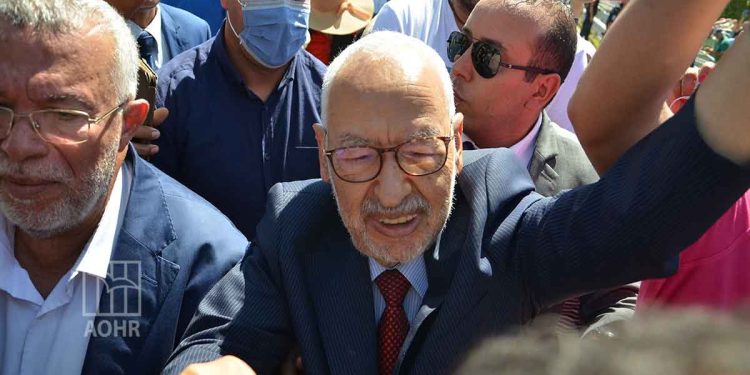Rached Ghannouchi, head of the Ennahda Movement and former Speaker of the Tunisian Parliament, has begun an open-ended hunger strike in solidarity with constitutional law professor Jawhar Ben Mbarek, who has for days continued his strike in protest against his continued detention in what is known as the “Conspiracy against State Security” case.
Ghannouchi’s strike, announced by his defence team, comes amid mounting anger within Tunisia’s political and human rights circles over the deteriorating conditions of political detainees, and what activists describe as a “vindictive approach” pursued by the authorities against their opponents.
Jawhar Ben Mbarek, a prominent constitutional law scholar and one of the leading figures of the opposition, has been held in Belli Prison in Nabeul Governorate since his arrest in October last year, following an 18-year prison sentence in a case the opposition considers politically motivated, while the authorities insist it is “criminal”.
The extension of the hunger strike beyond prison walls has lent the case a new dimension. Politicians and activists across Tunisia have announced symbolic strikes in solidarity with Ben Mbarek, among them Issam Chebbi, Secretary-General of the Republican Party, who declared from his own place of detention that he was joining the strike, in defence, his party said, of judicial independence and freedom of opinion.
At a press conference held by the “Coordination of Political Prisoners’ Families”, Ezzedine Hazgui, the father of Jawhar Ben Mbarek, announced that the family too would be joining the hunger strike, affirming that his son’s health was “deteriorating, but he remains steadfast.”
The case, which dates back to February 2023 when a sweeping arrest campaign targeted opposition figures, lawyers and civil society activists, has come to epitomise the country’s deepest human rights crisis in years.
Since President Kais Saied assumed exceptional powers in 2021, constitutional safeguards for freedoms have steadily eroded, with a systematic policy emerging to criminalise peaceful political activity and to use the judiciary as a tool to eliminate opponents, as evidenced by the nature of the charges and the pattern of trials.
The hunger strike by Ghannouchi, Ben Mbarek and those standing with them represents a collective attempt to break the isolation imposed on political prisoners, and to restore focus on the essence of Tunisia’s crisis: the absence of justice, the shrinking of free political space, and the transformation of prisons into a weapon against dissent.


























